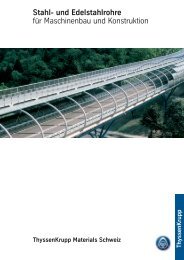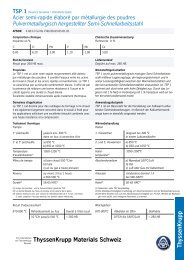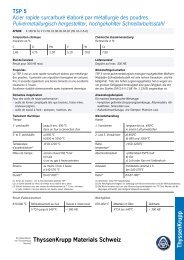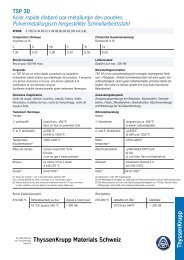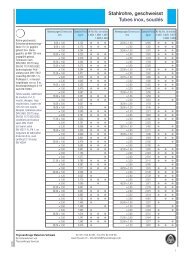ThyssenKrupp Magazin
ThyssenKrupp Magazin
ThyssenKrupp Magazin
Create successful ePaper yourself
Turn your PDF publications into a flip-book with our unique Google optimized e-Paper software.
homogeneously, with a focus on clearly defined economic and technical<br />
goals.<br />
You are the patron of a material innovation prize, which is awarded by<br />
<strong>ThyssenKrupp</strong> and the Ruhr University in Bochum. Is this an example<br />
of how you want to move material research from the company to the research<br />
departments of universities?<br />
The answer to this question has several aspects. For one, we cooperate<br />
with a series of national and international universities to recruit potential<br />
managers. <strong>ThyssenKrupp</strong> Germany alone employs 8,837 university<br />
graduates, including 6,430 engineers. Since the inclination to<br />
take a technical degree is declining fast among younger generations,<br />
we are working on joint programs with the Ruhr University in Bochum to<br />
convince young people of the attractiveness of the engineering profession.<br />
In addition, we want to identify the most promising students in<br />
these subjects. The material innovation prize is an excellent instrument<br />
to do this. I have been in contact with the relevant staff at the Ruhr University<br />
for years to push ahead with a reform of engineering training.<br />
Aspiring engineers urgently need business skills. As a trained mechanical<br />
engineer who also studied economics, I know what I am talking<br />
about. An additional 20 percent of a degree should be dedicated to<br />
business issues in the future. Graduates should know how a company<br />
works, as well as the meaning of sales, production, procurement of<br />
charges, accounting and much more. They should be able to calculate<br />
and know what project and value management mean. In this way, they<br />
will internalize that their work serves to safeguard and increase the<br />
company’s value in the end.<br />
So the innovation prize helps you find the sought-after engineering recruits<br />
who are so scarce in Germany?<br />
The materials prize is indeed a suitable means of contacting young people<br />
who are of interest to our company. In any case, we don’t primarily<br />
look for these people among trained engineers. We need creative employees,<br />
with a feel for technology and business thinking. This prize allows<br />
us to enter into an interactive dialogue with the university at an<br />
early stage.<br />
What happens to the freedom of university research and teaching if you<br />
cooperate with a university?<br />
The freedom of research and teaching is an important function of uni-<br />
TK <strong>Magazin</strong>e | 1 | 2004 |<br />
INTERVIEW 61<br />
versities, which we respect. But empty federal and state coffers mean<br />
that universities can no longer undertake just any research, without a<br />
goal. Public-sector budgets are being cut back, which means that competition<br />
among universities is getting tougher. The universities increasingly<br />
have to subject themselves to a ranking and become as attractive<br />
as possible in order to obtain third-party funds. In short, university staff<br />
have to seek contact with those who can honor their achievements financially.<br />
In this way, research and teaching are being co-financed.<br />
<strong>ThyssenKrupp</strong> AG maintains a lot of cooperation programs with other<br />
universities and schools, and the board members seek direct contact<br />
with these institutions. But aren’t these rather insufficient attempts for a<br />
high-technology company to find suitable employees, who – starting in<br />
the schools – are increasingly hard to find?<br />
I agree that the entire climate has to change. The environment looks very<br />
bleak. Students are less and less fascinated by technology. Young people<br />
rarely learn mathematics because they claim not to understand it.<br />
Even greater is the fear of getting an engineering degree, which means<br />
dealing in depth with mathematics, physics, mechanics, thermodynamics<br />
and chemistry. This skeptical attitude toward technology is reinforced<br />
by deteriorating political parameters. Various planned laws thus limit the<br />
scope or even threaten energy-intensive businesses in Germany. Meanwhile,<br />
politicians are concealing the fact that the processing industry will<br />
logically follow this departure in a cycle of seven to 10 years. I have the<br />
impression that the debate is being dominated by lawyers and sociologists.<br />
But no economy can stay above water with them and their concepts.<br />
How about a bit of optimism?<br />
As a realist, I analyze the facts first of all, and they don’t bode well for<br />
Germany’s technological development. But an entrepreneur also has to<br />
be optimistic. It is a hopeful sign that the federal government has declared<br />
2004 to be the Year of Technology. <strong>ThyssenKrupp</strong> is contributing<br />
particularly actively to the various activities initiated by Federal Research<br />
and Education Minister Edelgard Bulmahn. We have to keep lobbying<br />
on behalf of technology and innovation. We have to show young<br />
people that dealing with basic materials demands creativity, manual<br />
skills and in-depth technological know-how, and that working on solutions<br />
for technical problems yields a high level of personal and professional<br />
satisfaction.<br />
The interview was conducted by Heribert Klein<br />
Researchers are the drivers of innovation








